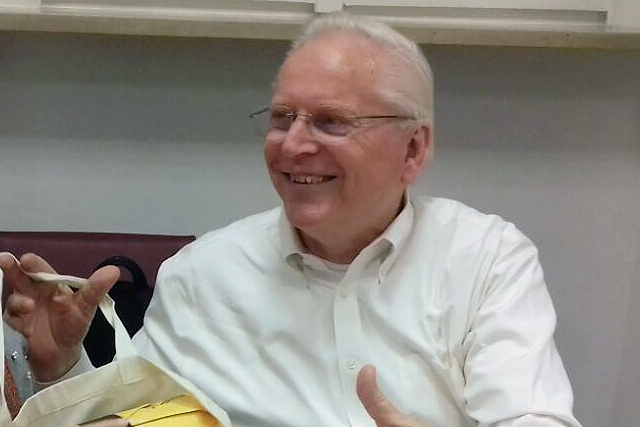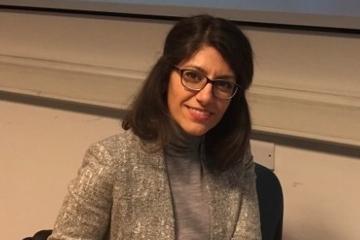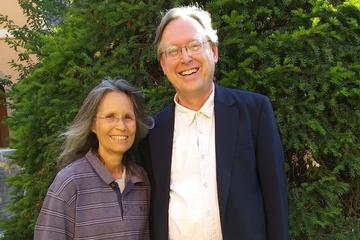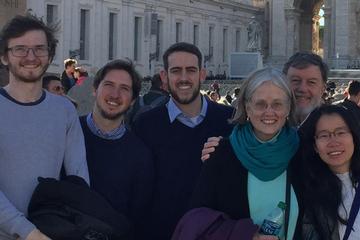
By Samantha Lin
ROME — A deep commitment to follow Christ led Professor Mel Robeck down a path he had never imagined for himself in his youth to become an ecumenist, now well-respected around the world.
The Lay Centre welcomed Professor Robeck of Fuller Theological Seminary, located in Pasadena, California, where he teaches church history and serves as a special assistant to the seminary president for ecumenical relations.
The Assemblies of God ordained minister, who was in Rome with his wife, Patsy, taught a course on Pentecostalism at the Pontifical Gregorian University this past spring.
During their stay at The Lay Centre, the Robecks shared with the resident community their decades-long experience of engaging in ecumenical dialogue and of breaking ground in ecumenical relations. Professor Robeck was also a featured speaker at The Lay Centre’s Interfaith Café.
Professor Robeck granted The Lay Centre an interview on his life and ministry with the Assemblies of God. The interview is published below.
The Lay Centre: How did you get into ecumenical work?
Professor Robeck: I grew up in the church. My parents were both ministers, and I had a number of uncles who were ministers as well. So, in a sense, the church was all I ever knew. I became the church organist when I was 9 or 10, and continued that until I left home at 17. I struggled to find my calling during my college years, and it was a young couple with a son in a Sunday school class that pointed me towards a teaching ministry. As a result, I took a pre-seminary course in a Bible college, and then went to seminary for my M.Div., and on to my Ph.D. in historical theology, with an emphasis upon the New Testament and the patristic period. During the first year of my Ph.D. program, the seminary administration invited me to take a mid-level administrative position, and I worked, from 1974 to 1992, in a variety of administrative positions, including seven years as associate dean of the School of Theology.
During that time, the Lord began to open my eyes regarding the breadth of his church. I grew to love the whole church in my patristic studies. I began teaching at the seminary in about 1980, when the provost suddenly died mid-course, and I inherited his New Testament Theology course titled, “Emergence of the Church.” In 1982, I was elected president of the Society for Pentecostal Studies, an academic organization, and the Lord woke me one night and, standing at the end of my bed, he said, “Mel, I want you to speak on ecumenism.” I argued that I had no background in the subject, and went back to sleep. He woke me again in the same way. I told him that I couldn’t because I would be in violation of the Assemblies of God bylaws. I went back to sleep, and he came a third time, with the same request. I gave up, and that decision to follow the Lord’s leading changed the entire direction of my life.
I had never had a vision before, and I have not had any since, but that one time was sufficient for me to do what he asked, very specifically. In my presidential address, I spoke about ecumenism for the first time. Someone, who was not a Pentecostal, sent a copy of my address to the director of faith and order in the National Council of Churches. He sent it to the Vatican and to the World Council of Churches. Soon, I began receiving invitations to speak, and then to join various dialogues. I have served with the International Catholic-Pentecostal Dialogue since 1985, and as co-chair since 1992. I have also co-chaired a monthly dialogue with the Archdiocese of Los Angeles since 1992. This is my 18th trip to Rome (127th to Europe) and Patsy’s eighth. I have been privileged to have 13 audiences with three popes over 28 years.
There are a couple of highlights in these audiences. In 1989, we met Pope John Paul II at Castel Gandolfo. We had our two oldest sons, Jason and John Mark, with us. He went out of his way to greet and speak with them.
And, in October 2011, I traveled with Pope Benedict XVI to Assisi for the Day of Prayer for World Peace, and found myself sitting with him, the Ecumenical Patriarch, the Archbishop of Canterbury, and the Patriarch of Albania. I protested that I was wrongly seated, but was told, “In this room there are no errors. You are seated where you are supposed to be seated.”
As I look back on my life, I can see the Lord’s hand directing me at many points. At first, I could not see how 18 years of administration was anything but a sidetrack. During those years, I learned many of the skills I have used to become an effective ecumenist: the ability to listen to others, really listen, the ability to think beyond classic boundaries, the ability to synthesize, the ability to draft documents in understandable yet meaningful language, the ability to take criticism, and the ability to cast vision for the future.
The Lay Centre: What were your first impressions about The Lay Centre?
Professor Robeck: What was nice was that someone met us at the airport. He brought us to The Lay Centre, and Heather met us at the front door. It was a very welcoming thing. When we got to dinner, we were delighted to find so many younger people here, who take their faith and their studies so seriously. They have a lot of vitality, and this community has embraced us in a wonderful way. We have especially enjoyed our fellowship with the students, because we have lived and worked with students all our lives. Patsy is very involved with the Fuller students, and we feel right at home here. There is a lot of vitality, comradery, and friendly teasing here.
The Lay Centre: What advice would you give to the students of The Lay Centre?
Professor Robeck: Stay faithful and do what Jesus tells you to do. That’s crucial to a life filled with grace. And be open to his surprises! None of you know today where he will take you, or what he will ask you to do in the future. Study broadly, but stay focused on the Lord. When Patsy and I graduated from college, we had an idea of where we thought the Lord would take us, and what he wanted us to do, but we have both been surprised and challenged by the wonderful ways he has led us since. God has a way of growing us in that process so that we can say, “Yes,” to the next step. Think, too, about how you will conduct your life. Live your lives in such a way that it reflects the Gospel. Our lives speak enormously to people on the outside, who need to see Jesus.
The Lay Centre: What class (did) you (teach) at the Pontifical Gregorian University?
Professor Robeck: I (had) 11 students in my course on “Global Pentecostalisms: Development, Doctrine and Dialogue.” It (was) the perfect size for good interaction.
When I return to Fuller Theological Seminary, I will focus largely on my Ph.D. students and in my dialogues with the Catholic Church, the Lutheran World Federation, the World Communion of Reformed Churches, the World Council of Churches, and the Global Christian Forum. I will also continue to research and write in the areas of Pentecostal history and in ecumenics. My contract runs through June 2022. I am free to do whatever teaching I want to do. I am currently working on a variety of articles and two books, one of them a multi-volume affair.


